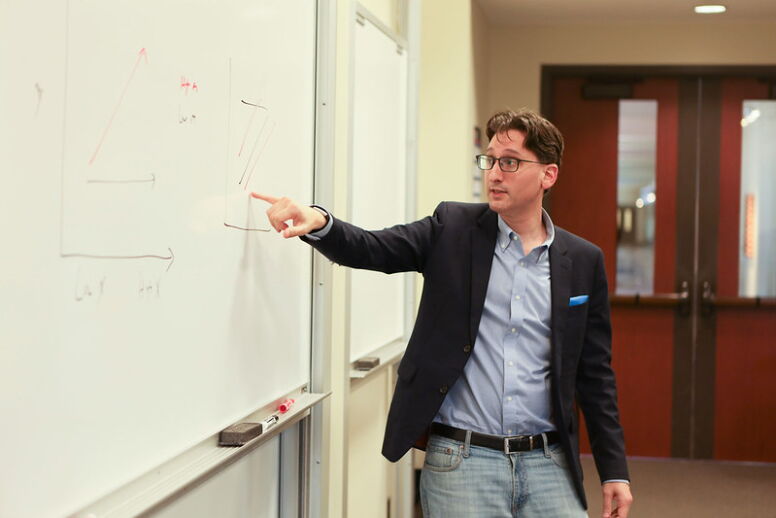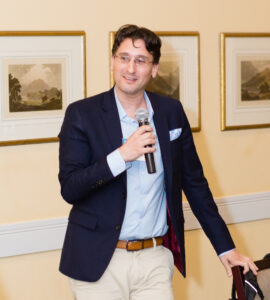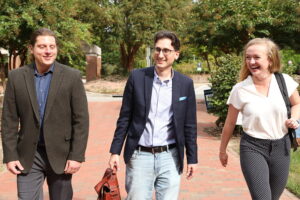News & Stories
A life guided by curiosity

Curiosity propelled Elad Sherf on a journey that brought him to UNC Kenan-Flagler Business School as an organizational behavior professor.
His journey began in Israel, where he was born. Serving in the military gave him the opportunity to train leaders and commanders about teamwork and leadership, areas that he continues to explore to this day.
Sherf went on to pursue a joint degree in business (BA) and law (LLB) at Reichman University, where he became “distracted,” as he calls it, by law, continuing on to work as a lawyer and earning an LLM from the same institution.
Feeling unfulfilled as a lawyer he investigated MBA programs, and headed to Sydney, Australia, where he earned his MBA at the University of New South Wales.
As he went through job searches and interviews for consulting jobs, Sherf realized he was passionate about ideas and scholarly conversations. He shifted his focus again, enrolling in the PhD program in organizational behavior at the University of Maryland. After graduating, he joined New York University’s Leonard N. Stern School of Business as a post-doctoral research scholar and manager of the Center for Behavioral Research.
His PhD advisor at Maryland, Vijaya Venkataramani, planted the seed for his arrival at UNC Kenan-Flagler when she predicted it would be the best fit for him.
“UNC Kenan-Flagler was always on top of my list, in terms of the people and the kind of research they work on. I admit that the proximity to nature and great weather also played a role,” says Sherf. “I don’t think even Vijaya knew how accurate her prophecy would turn out to be because two days after I moved, I went on my first date with my now marvelous wife, Jennifer. Yeah, so, this job turned out well for me on so many fronts!”
Amazing colleagues and students
The people drew him to UNC Kenan-Flagler and keep him deeply engaged. “My organizational behavior colleagues, with whom I spend the most time, are amazing researchers. They are passionate about a lot of causes. It’s a joy to discuss anything from scholarly work to world events, to books and TV shows with them. It’s fun, stimulating and I am extremely grateful for how they inspire me every day,” says Sherf.
“On top of that, I really get to teach high-caliber students,” he says. “We have some of the best students, they’re super engaged, care about the world, and are curious and open. It’s a joy!”
 Most of Sherf’s teaching is with Undergraduate Business Program students “who are just amazing.” He delivers two intense weekend courses – Leading Groups and Teams and Thinking Creatively as Individuals and Teams. All of his teaching includes intense, experiential exercises designed so students interact with the material head on by reflecting on real-time experiences.
Most of Sherf’s teaching is with Undergraduate Business Program students “who are just amazing.” He delivers two intense weekend courses – Leading Groups and Teams and Thinking Creatively as Individuals and Teams. All of his teaching includes intense, experiential exercises designed so students interact with the material head on by reflecting on real-time experiences.
“Take a group of stars and put them together, or bring together the most diverse team,” says Sherf, “and if the team is not able to structure the process underlying the psychology of their interactions, then it’s not likely to work.”
In his creativity class, Sherf offers a framework for students to tap into ingenuity. “Rather than think about creativity as ‘some people are creative and others are not,’ think about creativity as a process that is deeply intertwined with how our mind works,” says Sherf. “At the very basic level, why do we perceive things the way we do and why is it very hard to think outside of those immediate perceptions? The class gives students tools to communicate more deeply about our assumptions and ways to rethink them.”
He uses hands-on learning because it is more memorable for students, who can apply theories and ideas in a relatively risk-free environment. He evolves courses to keep them cutting edge, such as his redesigning parts of exercises so students have to incorporate artificial intelligence (AI).
“I think there are a lot of opportunities for students to gain a better understanding of underlying the psychology of creativity,” says Sherf. “Then, use some of the tools and frameworks that follow from that psychology to supercharge interactions with AI. If we use AI right, then it can multiply our ability to be creative.”
One challenge in human creativity, for example, is that most people have a hard time with divergent thinking or thinking about multiple ideas from different perspectives, says Sherf. AI has the potential to fill that gap because it is not limited by conventions and does not get “tired.”
What makes his teaching compelling is incorporating findings from the latest research. “Part of my competitive advantage as a teacher is that I’m also a researcher,” he says. “I incorporate evidence from the latest research and act as a translator. We keep updating our teaching materials, exercises and knowledge base to represent the ever-changing nature of our understanding of the science of business and psychology.”
Feedback and fairness at work
Research about resistance to feedback and fairness at work are two pillars of Sherf’s research.
Most managers would agree employees should speak up when they have concerns, ideas and feedback, says Sherf, but they often don’t invite employees to provide that input or discourage those who speak up. When employees do offer input, managers often resist, ignore or discount it. Sherf is examining the structural and psychological reasons behind the managers’ resistance to listening to their employees.

Elad Sherf (center) with Casher Belinda (left, PhD ’23), now a University of Notre Dame professor, and doctoral student Olivia Walker.
His fairness work centers on understanding structural and perceptual barriers to fair treatment. While managers are often motivated to act fairly, employees often experience unfair treatment – and Sherf is interested in the reasons for the gap between the two.
Working with PhD students often takes him “on journeys” that bring different topics to his attention.
Sherf is working with PhD student Alyssa Tedder-King to understand how structural sexism affects judgment about the fairness of performance rewards. For example, women and men could objectively provide the same customer service, but structural sexism results in women get lower ratings from customers for the same work.
Tedder-King and Sherf explore how people think about the fairness of reward allocations when evidence of such structural barriers is provided to them. The project examines implicit assumptions about meritocracy that dominate everyday conversations that need to be surfaced and discussed, says Sherf.
“When people say, ‘We should hire the most qualified person,’ they assume that qualifications are objective, but often they’re not,’” he says. “Yet conversation around fairness of issues like affirmative action don’t always directly acknowledge such assumptions.”
Sherf earned the Early Career Achievement Award from the Academy of Management’s Human Resources Division in August 2023. It reflects his work’s scholarly impact, which resulted in multiple publications in leading journals, and relevancy.
In 2022, both the Academy of Management Journal and Journal of Applied Psychology honored him as best editorial board reviewer. That same year, students named him a Teaching All-Star in the Full-Time MBA Program.
His curiosity isn’t limited to his professional endeavors. He and his wife adopted a puppy, which he describes as coming with a “learning curve” since it’s their first time training a pet.
Aside from reading social science books, Sherf indulges in epic fantasy. (Think “Game of Thrones” but broader in scope and depth.)
His extended family members are professional basketball coaches and players, and he’s continued his fandom from the U.S. Having a strong basketball background certainly makes life as a Tar Heel feel like the perfect fit.
“It’s been nice to be here and follow the team. Plus, team managers and students who are involved in the management of basketball often take my class,” says Sherf. “It’s always a pleasure to learn the stories about behind the scenes and figure out how they relate to what we discuss in class.”